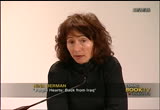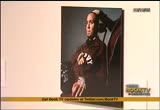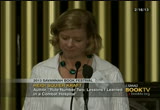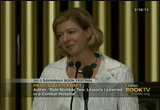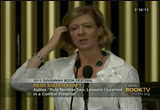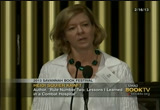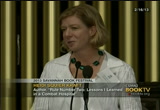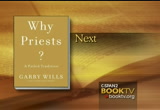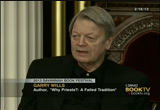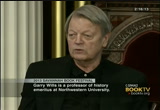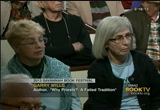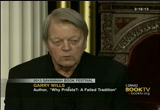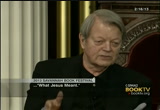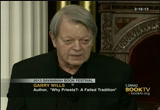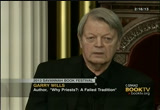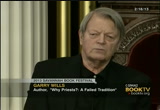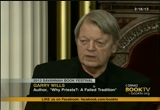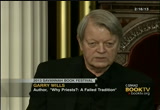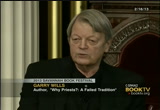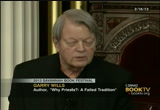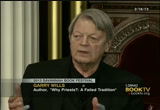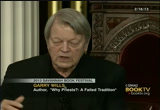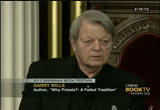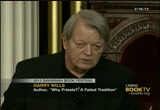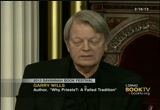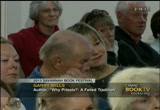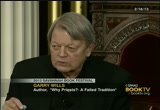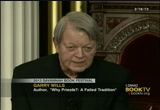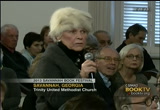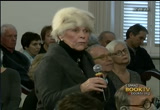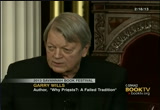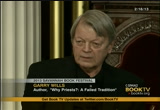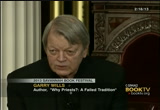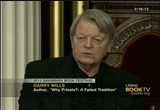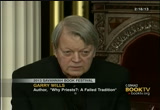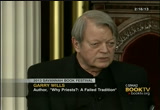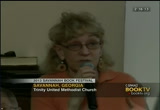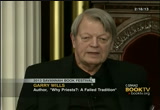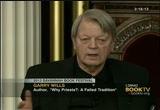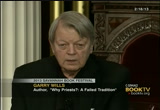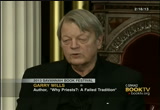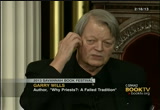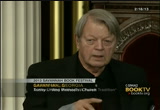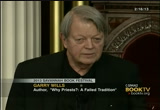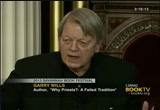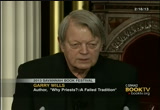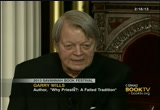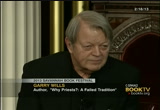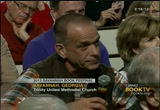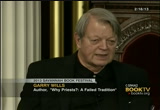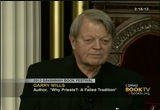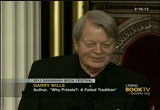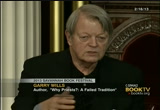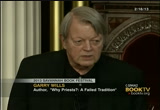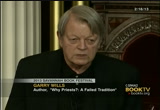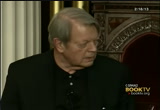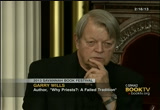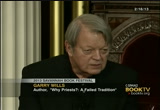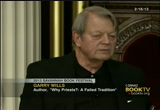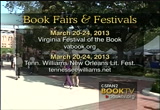tv Book TV CSPAN March 25, 2013 6:00am-7:00am EDT
6:07 am
illinois. he's wrote on 20 # topics like jesus, executive power, opera, and richard nix con. his book won the pulitzer prize for non-fiction. the newest book, came out just this week, called "why priests: a failed tradition," and he examines the priesthood in the context of the new testament. i'm honored to introduce to you mr. gary wills. [applause] >> pardon me for sitting. i can't stand for any length of time. we're asked to talk about our life in writing. my life in writing is tied up in st. augustine. i studied him in high school and
6:08 am
studied him in college, read him all my adult life, and more and more over the decades, i concentrated on him, wrote a life on him, translated the confessions, commented on the confessions, and working on my favorite book of his, the trinity. this book came out of that reading because st. augustine did not believe that the bread and win given out at mass is the body and blood of jesus christ. he said that's ridiculous. you don't eat god, you don't digest god. he said that over and over. what is the body of christ, he said? st. paul tells us you are the body of cryings. the people of god, the mystical body, the church is the body of
6:09 am
christ. well, i've noticed it was odd that's hardly referred to the fact that he didn't believe that that was the case, and he said it frequently and emphatically. i talked to peter brown, the great expert, and he was told by catholics that oh, august teen -- augustine believed it, but he believed in the early code of the church, which existed, but never applied to what was given out at the agape meal. it applied to the creed, especially. when you were prepared for baptism, you learned the creed by heart. you were forbidden to write it down or to say it out loud anywhere where a nonbaptized person could hear it. that was the innermost secret of the faith, the creed.
6:10 am
as i explored it more and more, there's a line of people in the middle ages kind of forgotten now for very good reason, they all had the view that's not really the literal body and blood, and i began to wonder why why do we never hear about the people? we didn't because they were condemned, but nonetheless, there was a tremendous argument about do we take this very literally? some people said, no, it's a symbol. it's gee -- jesus in a represented way. some said if the question came up, well, why is it not -- if it's jesus, why does it so much taste like bread, look like bread, smell like bread? they said it's bread too, but
6:11 am
jesus is in there. by the 13th century there was a hardening views that it was the literal body and blood of jesus so the theologians, preimminent among them, said they solved the problem distinguishing substance from accident. a dog is the substance, and he's a dog whether he's white, black, big, or small. he can be a great dane. the dog is still a dog. that's the substance. there are two different things, and so thomas said, well, why can't we say jesus now is the substance and it's only the accidents that are breads and wipe? one problem of that, of course; is that aristotle never said you could distinguish the two, but you can never separate them.
6:12 am
you can't have a dog that's white or black or any color, and you can't have a color that doesn't have substance it adheres to it. accidental means disattal accidental to a substance. it was a con game to say it solves the problem. it didn't really. i began to wonder why, against common sense and against really strong tradition was it so important to the church to encyst, and thomas did it in the most literal way. not only was the it substance of the body and the blood in each, but it was in every part of it. if you dropped a little part of the host, that was god on the floor, and you had to pick it up and either eat it, burn it, or bury it. you can't just let god be trodden on by anybody who wants to pass by. he went into long, long, long,
6:13 am
long stories about, well, what if a fly falls into the chal after? the fly is now coated with god. you got to take it out, wipe that off and burn the fly. what if poisen is put in, the priests can't drink the poisen, but it's still a poisen mixed with god so, again, you have to pour that out into the ground and you bury it up. in all of those ways, every little part, every little drop was god, was jesus. well, why we they so intent on enforcing this, and it was enforced with great rigor. it was her represent call to go against that. i think because there was a tremendous investment in the
6:14 am
priesthood. the whole point of the consecration of the bread and wipe is only a priest can do it. the whole community depends on him. if you have catholics coming together to pray any other way, and a priest doesn't show up, they have not had the mass. they have not really had the real jesus there. st. augustine thought when the people of god came together, that was the body of christ. he said when he gave the bread to them, that was a symbol they were the body of christ eating feeding their spiritual energy saying that's you lying on the at tar, that bread. he says, receive what you are, the body of christ. when had became a matter of the priests changing the very substance, it's an act almost of new creation, uncreates the dog,
6:15 am
the host, or the wine, and you create under a mere rack -- miracleous -- that made my go a step further and say what gave the priest this tremendous power? i started looking at the assessment, and the od thing is in the time of jesus, there were no followers. no more priests among the followers of jesus. there were priests, of course, the jewish priests, and the original followers of jesus went to tell. , observed worship, and went to synagogue. when paul went back from traveling, met james, ahead of the church in jerusalem, he said, you're traveling, a good jew, go to the temple and be purr mid. he did. they had priests such that they were the jewish priests, but
6:16 am
aside from that, the followers of jesus never offeredded sacrifice, which is what a priest does. paul mentions ministries like excysts, readers, speakers in tongues, healers, interpreters of tongues. all of these, but never mentions priests or calls himself a priest, never calls anyone else that he worked with a priest. peter was not a priest. peter was not a bishop because there was no bishops in rome in the first century. in the middle ages when the pope became the monarch, there was a tremendous investment in the direct power of the priest as a stand in for god, the victor of christ. that's normally said now about the pope, but it was said about the priest too because when he comes there, he is jesus, and he says this is my body when he gives communion, doesn't mean
6:17 am
it's the priest's body, but jesus' body, and he speaks like jesus, i forgive you your sins, the priest says i forgive you, but he means jesus. he stands in. he becomes jesus. he's separate from the rest of the people of god. you have the mystical body, and outside and above it, the priest. that was a tremendous power investment on the church's part. it was used as a power tool. if you didn't please the church, you could be excommunicated. that is, the priest could ri fuse to give you the body and blood of jesus. you are not part of the mystical body, yourself, you had to wait to get the body from the priest. if the propose in the middle ages was the monarch had armies,
6:18 am
had countries, realms, spies, had prison, had torturers, and when he got into an argument with another country, if he wanted to really enforce hiss will, he would slap an interdict on them. saying i'm not going to let any of the priests concentrate you first in your kingdom until you knuckle under. that's how you used the power of the priesthood. well, jesus said, don't put yourself above -- when the disciples argued along the way, jesus said, what were you arguing about? they said who will be in charge when you're gone. he said don't think about putting yourself above any of your fellow followers. he said don't be called father. you have one father in heavy. don't be called rabbi. you have one teacher in heaven. there was no priesthood and
6:19 am
no -- and jesus advised against it being a priesthood. how does that come in? well, when the temple was built, destroyed by the romans in 70, the year 70, the priest ended, the sacrifice ended. there are no more sacrifices the temple, but an odd griewn of followers of jesus who had had that up to that point, they had observed temple worship, missed it xz -- it, and an odd letter is written to the people. it's means people yearning back to the hebrews, and nobody know who wrote it. it was attributed to paul for many years, but it's definitely not by him in doctrine or language or in any way. it remains totally anonymous.
6:20 am
there's many attempts to figure out if an author for it. the los angeles is different from the new testament, and there's many, many new words, different words. it's good greek, by the way, whoever it was -- it's a weird argument. because he is trying to placate yearning back towards temple worship. he does two things. he says, you don't have to worry, we have our own sacrifices, and it's better than the old temple worship. on the other hand, he wants it similar to satisfy the fact that that is what they are yearning back to. he tries to show saying ours is better because that was animal sacrifices. we have human sacrifices. jesus iewfers himself up as a sacrifice to god, to the father. augustine really destroyed that argument too saying, you think
6:21 am
the fatherments to kill his son noter to make himself happy? with mankind? he says in a way it's light, the temple sacrifice because after all, the carcasses of the slaughtered animal burnt outside the wall, and jesus was crus mid outside the wall. jesus was not a levite, he was not descendent from aaron, but from the tribe of judah. remember that strange person in the book of genesis, he was a high priest, he was a high priest of the caananite god, but they offered a tithe tithe to him, to the priest, the normal tides to the temple, and he said not animal abraham, but aaron offered a tithe to him because he was in the loin.
6:22 am
eventually, he'd be born in the line of abraham to through that connection, he found a new kind of priesthood, and jesus is in the line of him although he can't be in the line of the levites. to this day, catholic priests are ordained into the order of him as a priest forever. even though the letter to the hebrews had said jesus is going to do this just once. our sacrifice is better because it's a one sacrifice for all time, for all people whereas the high priest comes in annually and offers sacrifices over and over and over year by year by year for sins accumulating. even the letter to the hebrews did not imagine jesus was setting up a line of priests who would follow him, so through of
6:23 am
series of strange accidents, you set up a sacred order outside the normal people of god, and, of course, it cull -- culminates, and only the pope is consecrate bishops, and only the bishops can ordain the priests, and they all answer to the top so people talk about the pope as the head of the church. that infuriated paul. jesus is the head of the church, not any human being. lucky, catholics are developing the art of ignoring the pope on a lot of ground, which they should do. in fact, in the 19th century in england, john henry newman wrote the laity is sometimes more true to the gospel than the
6:24 am
hierarchy, and he was denounced in rome and he had to fold the journal in which he wrote that and pius ix issued a syllabus of errors saying not just the laity shouldn't have a say in things, but ordinary people shouldn't have a say in things. democracy is an invalid form of government. the friend and fellow catholic of newman said to gladstone, the prime minister, who said, the pope is just a tact. every form of government, and he said don't worry, catholics don't pay attention to the pope when he talks politics. well, more and more, we're not paying attention, not only on contraceptives which is abandoned by catholics for decades now, but even on things like literal body railism about
6:25 am
the body and -- literalism about the body and blood of jesus. the most hold under cattics under 30 done in the 1990s showed that 40% of them already didn't believe that it was the literal body and blood of jesus, catholics under 30, and we don't act that way anymore. there's an old saying, the way you pray is the way you believe. you act out your faith. well, when i was an altar boy, if you dropped a hogs, that was gone, and all had to gather around and doing in intowt it. if you spilled wine, you had to wipe it up and burn all of that. now, you know, to avoid having that problem, you are given a little thin host so that it moments on your tongue so you didn't have to treat it like
6:26 am
ordinary food and chew it. now we eat plain old bread. in my church, it's basically a muffin, and there's crumbs all over the place, but nobody sayings, oh, my god, we have to get god off the floor. [laughter] there is an actual belief of the body of christ, the people of god that exists apart from the dictates of the folks who had been coming and going, and i think that will grow. it's existed in the path. there was a lot of, not only ignoring the pope, but attacking the poem and hating the pope in the middle ages. dante painted popes in hell. this adoration of the poem came in with pius ix.
6:27 am
i was asked a lot the last few days who do you think will be the new pope? i said, i don't care. i want the pope to be irrelevant. he's working very hard to achieve that. [laughter] that's what the book's about, thank you. [applause] >> a few questions here, yea, ma'am. >> you mentioned that priests were not cred depp issue until after jesus was crus mid, but at the last supper, didn't jesus say to the 12 apostles, including the judas who betrayed him, do this in memory of me? >> not after the crus fix, but before, do this in memory -- said this is my body, this is my
6:28 am
blood, do this in memory of me, but when he said it, you know, does that mean that bread was really his body? what was giving the bread? you know, his body was there when he gave the bread to them. it was a symbol of their union. they didn't mean start eating me. don't eat my arm that's giving you this. don't eat my hand. when he's giving my body and blood to you he means my life is yours. it's the way we'll say my heart and soul yours. >> say they were priests at that time? >> there are no priests, no. >> in memory of me and sent out the 12 # men -- >> pardon? >> just disciples -- >> well, they were various titles. the highest title -- paul says there are apostles, prophets,
6:29 am
there are rairds, and -- readers, and then the original church was charismatic saying the spirit gives different graces to different people. do these different things, but all charismatic movements need a certain amount of organization we find out that servants which now are called deacons take care of getting food for the congregation, but the word for priests and those who offered sacrifice, nobody is called that in the new testament other than in the one letter for the one and only time, and no other follower of jesus is called that. the main thing to think of is that the very word was never used of any follower of jesus in
6:30 am
the new testimony. >> [inaudible] >> well, the book just came out. i'm not getting too much, but i've been getting priests at the various readings. i've halfway into the book tour, and most of them, as you would imagine, come because they agree. a lot of priests agree. you know, a lot of priests are resentful of the kind of discipline they live under. it's not just the last monarchy, but it's the last of both of the systems. it's toal -- totalitarian. you can't be a priest without being ordained by a bishop, and a bishop can't be con se --
6:31 am
consecrated without being appointed by the pope. if the priest disagrees with the teaching on contraception as many, many, many of them do and have told me, they can't say that. if he says it, the vatican tells the mission to tell that priest down. it's a totalitarian system. the preach, the priests who live under it have various reactions, various rationalizations, some resent it, some leave, others figure, well, i do enough other spiritually important work that i just have to swallow my misgivings on this, and so they ignore it. you know, no priests anymore preaches against contraception. bishops thunder on it saying wii not going to give communion to people who disagree with us, but priests don't really doo that anymore because they are -- their close enough
6:32 am
to the community to know that's just gone. >> so do the baptist and presbyterians have it right or is there some aspect of con csh catholicism you maintain that the other denominations have been sort of -- where the body of christ is the congregation, something just left in catholicism? >> yeah. there's several ways of stating that question. one is if you don't like the pope, why don't you leave? i don't think the pope is a church. that's saying the propose is a church so i have to get out. say say, well, you're no
6:33 am
presidenter than protestant. they got me. [laughter] i am no better than a protestant. do i have to leave the body of christ? where do i go? i'd join the body of christ because the protestants are baptized believers in jesus. the one gospel text that's least add verted to now and in the past is the chapter nine in the gospel of look. we came across a man casting out devils in your name, but he was not one of us. we made him stop. he said, why did you do that? they were doing it in my name. if they are for me, they can't be against me. well, the history of
6:34 am
christianity has been a lot of jewish -- christians saying to other christians you can't use jesus' name, stop, it belongs to us. we own it. the great scandal of christianity is that christians have killedded christians in massive numbers. popes have burnt christian hair ticks, massacred heretics. they were christians doing it in jesus' name. queen mary i of england burnt 200 protestants because they were not catholic. queen elizabeth, who was a protestant, chopped up by the scores because they were not protestants. calvinists in new england hanged quakers. protestants in america burnt convents. these are jesus' people killing
6:35 am
jesus' people. that is what has to stop. for me to say that i want to be part of the body of christ that i have always lived with doesn't mean i don't want to be part of the christ of lutherans. i am no better than they are, but they are no better than we are. we are all really one if we just start reading the gospel again. >> i just wonderment i'm a lutheran. we have hierarchies. why do you think all the protestants, like why did they break away and then do the same thing? with having bishops and -- it must work, somehow. >> yeah, ignore theirs the way we ignore ours.
6:36 am
[laughter] >> [inaudible] >> yeah, well, the pope became a monarch in the middle ages because all authority was monarchs, and in a way, that was giving into the popular mood at the time, and the church, you know, the idea that the church never changes is nonsense. of course, it changed a lot. it's changed in reaction. it was a popular thing to be one in the middle ages. that's the expected thing. orders were already in place, and they wanted to organize society around the obedience as to the pope and the priests. the masculinity, the mail --
6:37 am
male only monarchy was a part of that. you know, what the pope -- what paul vi said, jesus only ordains maryellen -- ordains male priests. no one was a priest then. there were women leaders, very high leaders. paul talks about one as an apostle. he was talkedded about one as his coworker,s same he said of timothy and titus and others, and the original agape meals were in households. paul address the households. household church was the original church, and the hostess there was the presider. she was not a priest because there were no priests, but as time went on, the general prejudices of the society
6:38 am
insected the church, and they are hanging on to them longer than others because the church now pretends to be changeless. once a bad idea gets in, even if it's from a fairly acceptable thing at the time, it's very hard to extrude it, you know, because of the church. they claim they never change. people said, well, should we have women priests? i hope not. i don't want priests. i want women leaders. we are getting them. in my church that i've been going to for 33 years, it's a campus church at northwestern university, and as all campus churches or parrishs in general, priests have come and gone. we had no say in that. the priest comes when the bishop tells them to and goes when the bishop tells them to. one priest we wantedded to hold on to, and we asked to let him
6:39 am
say, and he said, no, i have other uses for him. that's one of the bad things about this hierarchy totalitarianism. during that time, first one woman, and then for a long time another woman, was very important to the community. it's a come pus church so there's a lot of students who were converts, prepared them for baptism, for marriage, prepared -- we didn't have a lot of children, but we had chirp. she would take care of them. she was closer to the community than the priest was. when the first one resigned because she was getting old, the fair well for her was such that her students who had gone through under her came back from around the country.
6:40 am
there was much more celebration of her than of any priest that left, and after she left, mary came in. she had been a student of theology. he was -- she was preaching into the bishop got word of it, but she was doing the same thing, and she's closer to the church, and she's the real glue that holds together this part of the body of christ. i want women leaders. we're getting them. there's more women studying theology all the time. there are there's a greater role for deacons. there's about as many deacons as priests now. they are ordained to a minor order, they don't have the sole power to consecrate which is the source of the problem with priests, and, of course, it's also setting apart the body of christ in terms of denominations.
6:41 am
that is only we have priests; therefore, all the other places that don't, and even the ones who think they have priests don't really, you know? paul vi says the athens think they have priest, but they don't because they were in the ordained by bishops in the succession. only descendents of peter, only the succession from peter can do that. their sackments are invalid. they should stop. you know, it's the same old story. they think they are doing it in jesus' name, but we got to stop them. in terms of the male monarchy, that'll hang on in rome like all of those outdated things there, but it's changed on the ground. >> i want to compliment you on your book, a stupendous read. >> i didn't get that?
6:42 am
what did you say? >> [inaudible] >> oh, i'm so glad you liked that book. that's such fun to write it. it's about the milan of ambrose, the 4th century bishop. he was like in that when you were chosen originally, even when priests came in, they were chosen by their congregation, and then bishops were chosen by their congregation, and when you chose it, you had to take it because they were the boss. they are the people of god. ambrose, a secular ruler at that time when they said you got to be the bishop of milan, he said, no, i can't. you know, my hands are unclean because i've had the secular
6:43 am
power, and, besides, i'm not even baptized, and he said, sir, we'll baptize you. they baptized him, ordained him, and consecrated him in a week and he was the bishop of m, ilan, immensely important leader and ruler setting up a chain of churches, and he had this big double cathedral, and augustine who came from africa to serve the emperor who was living across town because the emperor moved up from rome to milan to face northern threats, he set up these churches, and augustine on the side of the emperor originally and not thinking of ambrose thinking he was a demagogue, finally, through various other people he accountanted wanted -- sued for baptism on the part of ambros, e
6:44 am
and so ambrose baptized him. my wife and i spent fun times going to all the churches because since they were phut -- put up by him, children are called, and painters paint, you know, and anyway, because that was such fun, they were really amazinged when we found -- amazed when we found out after going there for sometime that the big double cathedral he inherited from an area was raised in the 14th century and they had a huge gottic cathedral.
6:45 am
the others was all lost other than in world war ii, they dug for bomb shelter and became across stones done below. after the war, they started digging around and found, there's the cathedral, all laid there, all five aisles of it, it's 80 # some yards long, it seemedded to have disappeared, and over the years he reconstructed the story, but the most important part is there's a separate standing building which was where the secret of the creed was first learned, and it only opened on easter day to let in new, and it was a famous place, and there was a lot of baptists were formed in imitation of it. there was a famous set of
6:46 am
inscriptions around it. there's a great pool, and that time, of course, you were totally immersed three times and come up at the end, do you believe in the father, immersion, do you believe in the son, immersion, do you believe in the holy spirit, immersion. that's the place where he baptized augustine, and that makes it such a say credit spot for me. we were amazinged when my wife and i went there, you go inside the cathedral, and right inside there's stairway with a small sign with one or two euros, whatever it is, and we go down there, and there's nobody there. one custodian, sometimes two or three people down there a long time, but nobody pays any attention to it. they wanted to take the elevator up to the top, the site at the
6:47 am
top of that cathedral, and, anyway, the fount of life is the book i wrote about that, about that's the fount of life. how augustine was instructed in the day, and how ambrose fought for the church. his father against, and his mother on the side of ambrose so it's -- it's a thrilling place to me and a thrilling story, so that's kind of my favorite book now. >> do you think seeing that the vatican was granted with nation state status in the 20th century, is there -- the italians really seem to really disfranchised themselves from the catholic church. is there any chance that they will lose that status, and will that, you know, facilitate, you
6:48 am
know, the destroying the hierarchy? >> he asked whether the vatican as a separate state will cease to exist. no, i don't think so because, you know, it's a historical curiosity. it doesn't bother most people. pius ix said you can't take my realms away from me. they said, yes, we can. he said, all right, i'll seal myself up in the vatican and i'll be a prisoner, holding you as my captors. he refused to go out on the balcony and face the world and say, "blessings to the world." well, his successors, first pius x and pius xi had to back off from that daying the vatican as a prison. pius xi said if you'll give us a
6:49 am
certain number of advantages, muse leanny, if you make education in the italian schools catholic, if you'll treat catholicism as the state religion of italy, then we'll set up a concordance with you, and you'll give us the status of a separate country. the van can is a separate country. it doesn't have any normal citizens, you know, no women citizens. it's got post offices and other signs of the government, but it's a fake government. it's a fantasy government. you know, it's kind of a disneyland government. [laughter] nobodiments to take -- nobody wants to take it away. my wife refused to go to the vatican after the first few times. it's got beautiful treasures in
6:50 am
there, but it's a great fortress is great treasures inside, and everywhere, paintings of the donation of con stan tine, the mystical giving of worldly power to the pope, painting on chairs of the bishop peter, which he never was, coats of arms of all of the noble popes who took over in the renaissance, and she said, you know, what could be more against the gospel of jesus than this earthly trumpeting of power and pride? it's not going to go away, but as i say, we really should start treating it with the disrespect it deserves. [laughter] >> is it possible for a church
6:51 am
or religion to have structure with hierarchy, implied leadership? is it possible to have that without coming into a toal tearianism, and if so, is it possible to do that, and what would be the best structure? >> yeah. is it possible for a church not to have a high ark yal structure? no, they always have to have it. what's bad is that the priest has this exclusive power over the sackmental life of people, you know, and it comes to -- a priest can refuse to forgive you your sins. a priest can, in effect, send you to hell. it's an exclusive power to be jesus, to change the sack countrimental species, to be the arbiter over sin and marriage. priests can say you are marryied
6:52 am
or you're not. they said both to my mother at one point. that kind of -- that priest is the body of christ and is jesus. you can have hierarchy structures, and there's all kinds of original structures in the church even of paul, and, certainly, of the pastor letters and in the acts of the apostles, but that secret power of the priest, and, of course, that's what led to the scandal of the sexual abuse. sexual abuse is a horrible tragedy, and it occurs all over the place, unfortunately. it occurs in scouting, families, everywhere. what happened here, though, is that it was impossible to say, for a lot of people so say a priest could do this. after all, his hands are tied together when he's ordained,
6:53 am
consecrated for the use of mass. when they had his finger chewed off by an indian woman in torture, he had to have permission in rome to consecrate with the other finger, that those fingers were stroking a penis of a boy. it was not your first normal abuse. parents tended not to believe things, father couldn't do that, no. when they thought there was something to it, and they went to priest, the priest would say, no, certainly he couldn't. the boy is lying. that went on and on, then, when they finally this to give up, they said we'll pay you some restitution if you say don't do it, don't tell about it. that was another thing they said, well, it did happen, unfortunately, and it's awful, but you don't want to cause
6:54 am
scandal in the church, do you? you don't want to hurt the life of the church by publicizing this. the payoff for secret, the attempt to keep it secret. the denial going to the vatican, if you have not seen it, i hope you will. the hbo special on how extensive was the cover up, the denial, so there's the scandal, and then there's scandal on scandal on top of that. all that comes from this so-called special holiness of the priest. he's not jesus. we're jesus. >> this will be the last question. [inaudible] >> twice you've referred to the creed as being something that was in common for all the
6:55 am
baptized to accept and that it was so important that it was kept secret and so on. which creed are you referring to, and how does it relate to the apostles creed that is recited at every mass today? >> yeah. the creed recited by augustine when he was body and blood tight -- baptized by ambrose was the apostles creed, but both creeds, the nigh seen is now recited at mass, both are the essential creeds referred to as "the creed," and, by the way, when cardinal, before he was the pope, was asked by somebody, are you -- aren't you disturbed that a lot of catholics don't seem to be paying much attention to what the pope says they should be doing? he said, no, doctrine is not
6:56 am
reached by majority vote. it comes down from god. well, where did the creed come from? it came from the apostles originally in a kind of mythical way that they had all recited it, but it -- if that's the case, they were not priests. the nicine creed, hundreds and hundreds of bishops gathered and voted on the trinity, on the incarnation, on the resurrection, on the basic truths of the faith. there was a vote. there was a minority and a majority, and the majority won, so that was the way the truth was declared by the church. the people of god, that -- and the bishops who had gone there had been chosen. the church was originally very democratic. as i say, if they chose you, you had to do it if you were the bishop, and once they chose you, you could not leave them.
6:57 am
augustine, ambrose didn't want to be a bishop, and augustine said the same thing. they wanted them. when you accepted, they had to stay with their boss. they said we're the people of god appointing you. augustine had to ask permission of his people to travel to an african council, and this was observed well after the middle ages, a bishop could not become a pope because he couldn't leave his dicoese. monks became popes, nephews of roman aristocratic families were popes, but bishops didn't. they couldn't. they couldn't leave their people, so those are the two creeds that i think of as the voice of the people of god. >> that's all the time that we have for today. >> thank you, all. >> thank you very much. [applause]
109 Views
IN COLLECTIONS
CSPAN2 Television Archive
Television Archive  Television Archive News Search Service
Television Archive News Search Service 
Uploaded by TV Archive on

 Live Music Archive
Live Music Archive Librivox Free Audio
Librivox Free Audio Metropolitan Museum
Metropolitan Museum Cleveland Museum of Art
Cleveland Museum of Art Internet Arcade
Internet Arcade Console Living Room
Console Living Room Open Library
Open Library American Libraries
American Libraries TV News
TV News Understanding 9/11
Understanding 9/11